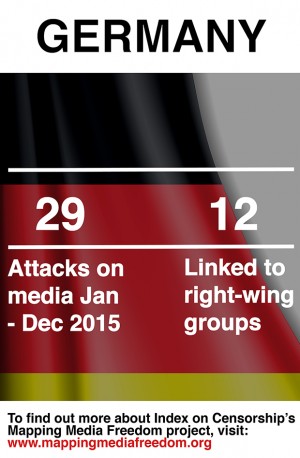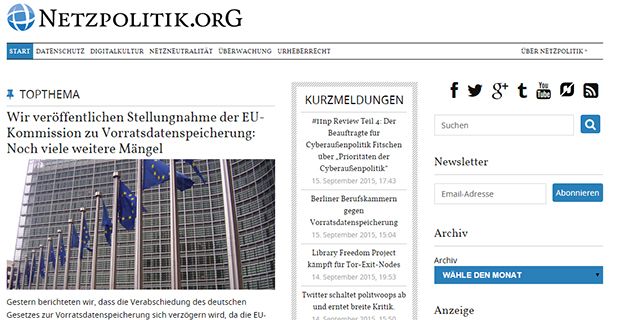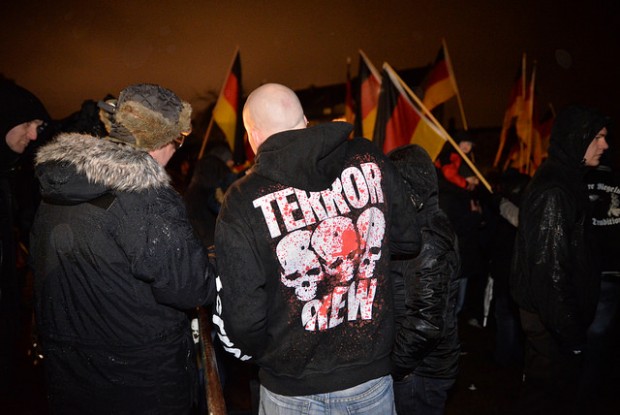15 Jun 2017 | Statements
[vc_row][vc_column][vc_column_text]Increasingly, governments are devolving responsibility for determining what constitutes unacceptable content to private companies.
Legislation approved by the German cabinet in April 2017 threatens fines on companies that fail to take down content that might contravene some 24 current provisions of the German Criminal Code, including offences as varied as “defamation of the state and its symbols”, “anti-constitutional defamation of constitutional organs” and “defamation of religions, religious and ideological associations.”
The measure effectively outsources decisions on the balance between freedom of expression and other legally protected rights to private companies and so threatens open and democratic discourse at the heart of the one of the world’s largest, most stable democracies.
The idea that the threats we face are in some way more acute than those that have gone before — and therefore necessitate a restriction of hard-won freedoms — is not new.
“Those who would give up essential liberty to purchase a little temporary safety deserve neither liberty nor safety,” argued US founding father Benjamin Franklin, showing the conflict goes back centuries.[/vc_column_text][/vc_column][/vc_row][vc_row][vc_column][vc_custom_heading text=”Don’t lose your voice. Stay informed.” use_theme_fonts=”yes”][vc_separator color=”black”][vc_row_inner][vc_column_inner width=”1/2″][vc_column_text]Index on Censorship is a nonprofit that campaigns for and defends free expression worldwide. We publish work by censored writers and artists, promote debate, and monitor threats to free speech. We believe that everyone should be free to express themselves without fear of harm or persecution – no matter what their views.
Join our mailing list (or follow us on Twitter or Facebook) and we’ll send you our weekly newsletter about our activities defending free speech. We won’t share your personal information with anyone outside Index.[/vc_column_text][/vc_column_inner][vc_column_inner width=”1/2″][gravityform id=”20″ title=”false” description=”false” ajax=”false”][/vc_column_inner][/vc_row_inner][vc_separator color=”black”][/vc_column][/vc_row][vc_row][vc_column][vc_basic_grid post_type=”post” max_items=”12″ style=”load-more” items_per_page=”4″ element_width=”6″ grid_id=”vc_gid:1513167493075-fe4186d8-a3f4-4″ taxonomies=”16928″][/vc_column][/vc_row]
7 Nov 2016 | Europe and Central Asia, Germany, Mapping Media Freedom, News and features
[vc_row][vc_column][vc_column_text]
What is worse: intelligence services gathering data without any legal basis or secret services operating within a legal framework that allows them to obtain vast amounts of personal information? This is the key question regarding Germany’s surveillance apparatus, as a new law regarding its foreign intelligence agency, the Federal Intelligence Service (BND), was passed through parliament on Friday 21 October.
Following the 2013 uncovering of the mass-scale surveillance by America’s National Security Agency, including details of the tapping of German chancellor Angela Merkel’s phone, there was a sense in German public debate that secret services were out of control. In early 2014, a parliamentary committee was established in the national chamber of the Bundestag to investigate the scale of surveillance activities of foreign intelligence in Germany. Attention soon shifted to the role of the BND, after former NSA employee Thomas Drake called the agency “an addendum appendix of the NSA” in his testimony to the committee in July of that year.
While the German government began the process to reform the legal framework of the BND, the governmentally-appointed officer for data protection and freedom of information took a closer look at the work of the service’s telecommunications unit in the southern town of Bad Aiblingen.
What it found was remarkable: across 60 pages, the expert report from March 2016 listed legal breaches by the BND. Although the intelligence service had been “repeatedly and heavily obstructing my work”, the officer was able to gain a picture full enough to pinpoint 18 “serious transgressions” and submit 12 official complaints, which, according to the investigative tech-blog Netzpolitik.org, is a record unrivalled by any governmental office in Germany to receive at one point in time.
Netzpolitik.org also made public the “top secret” labelled report in September.
Surveillance-critical civil society in the country may have been hopeful to see the intelligence service face consequences for past transgressions and future limitations for its activities. They were in for a surprise, though, as the BND law put forward in June this year proposed to legalise all surveillance activities that had thus far been taking place and further expand their scope additionally. The new law allows the foreign secret service thus-far illicit in-country surveillance.
In theory, any German-to-German communication would have to be excluded from surveillance, but two independent reports by experts, including one by Chaos Computer Club, found that online traffic does not carry a clearly discernible nationality. The constitutionally stipulated freedom of privacy of communication suddenly appears less convincing. It also follows that any non-EU national is not considered bearer of fundamental rights enjoyed, on paper, by anyone living in Germany, as all electronic communication including at least one foreign-based party can now be analysed and stored for up to six months, including all metadata. This will include foreign journalists and the sources they are in contact with. The previous 20%-rule, whereby the BND was limited to only intercept and analyse so much of the traffic available, was lifted altogether. The extended competencies were not left without a new and grand mission: surveillance can now take place to reap “insights into foreign and security policy [which] may be of relevance”.
Senior investigative journalist David Crawford spoke to Index on Censorship about an opportunity missed in the sense that the “legislative process had not been used as a forum what intelligence services should do but…to legalise practices that were already going on”. A “silent consensus” across the grand coalition seemed to exist and it appears that policy-makers close to the intelligence services had successfully dominated the reform process and delivered a law tailor-made for the BND.
Although the result may be unsatisfactory Crawford said that, in the German context, it was generally “positive to write down the rules of behaviour” for a practice that have been ongoing for decades and employed by more resourceful intelligence services worldwide. While especially the aspect of information sharing between foreign secret services appears worrying to Crawford, the investigative journalist points out that this professional group never had any “real protection, they are treated like any citizen” under German law. Thus, he emphasised that no journalist should pass the responsibility for safeguarding his or her sources to the state law or EU regulations: “It is up to the person to get the training they need, to put a lot of thought into how they can do this without somebody getting hurt”.
While extensive electronic surveillance by multiple states has to be reckoned with, regardless of a legal basis for the practices, the journalist should employ the right kinds of “tricks of the trade” to make sure that any whistleblower who helped uncover a story will, under no circumstances, suffer: “a lot of the time it is just going out meeting people, not using the phone, not even using the mail…I figure out a way to meet them, knocking on people’s doors or meeting them in a supermarket or somewhere, where you are unlikely to be monitored and they would feel a lot more comfortable talking…Use less technology, use a pencil, cite documents rather than announcing you have a whistleblower.”
According to Crawford, the lack of investigative journalism in general and the unawareness of some journalists engaging in serious investigative projects may be at the root of a sloppiness with the more time-consuming methods that the job requires in a reality of surveillance.
However, civil society activists maintained a responsibility of ethics reflected in legislation and protested with petitions and a solemn vigil on the evening prior to the final vote. As the law was being passed on the morning of Friday 21 October, the former liberal justice minister Sabine Leutheuser-Schnarrenberger announced constitutional charges against it. Meanwhile, the German intelligence service has other legal cases pending against it: the worldwide largest data transmission exchange business based in Frankfurt, DE-CIX, is seeking to get a “judicial review for the practices of telecommunication surveillance” for its customers. Another lawsuit filed by the German branch of Reporters Without Borders in June last year is based on the office for data’s annual report for 2014 and is seeking to defend all journalists and their sources against the transgression of the privacy of communication as an attack on press freedom.
[/vc_column_text][/vc_column][/vc_row][vc_row][vc_column][vc_basic_grid post_type=”post” max_items=”3″ grid_id=”vc_gid:1478541493543-29b41d55-076a-3″ taxonomies=”6564″][/vc_column][/vc_row]
15 Dec 2015 | Europe and Central Asia, Germany, Mapping Media Freedom, mobile, News and features
Pressure is mounting on journalists in Germany from right-wing groups that intimidate, insult and sometimes physically assault them, according to an analysis of reports filed to Index on Censorship’s project Mapping Media Freedom. In 2015 there were 29 attacks on media in Germany, 12 of those incidents were connected with the far right.
Starting in autumn 2014, the anti-immigrant, right-wing extremist group PEGIDA (Patriotic Europeans Against the Islamisation of the Occident) began as a protest movement that a year later still holds large demonstrations in cities around the country. PEGIDA, along with the populist right-wing political party Alternative für Deutschland (AfD) and similar extremist splinter groups frequently hold rallies that have become sites of aggression and violence against journalists reporting on them.
In 2014, Germany’s annual prize for Un-word of the Year for the most offensive new or recently popularised term went to “Lügenpresse” (lying press), a motto chanted at protests to smear journalists. Angry demonstrators call journalists part of a biased political elite. When journalists try to interview rally participants, they’re often turned away, yelled at or attacked.
“Index is extremely disturbed by the continuous attacks on journalists by right-wing protesters in Germany,” said Index on Censorship’s Mapping Media Freedom project officer, Hannah Machlin. “Media workers have been repeatedly assaulted and insulted in their line of work and these aggressions must be addressed by public officials in order to preserve press freedom in the country.”
Below are five recent stand-out cases of right-wing extremist intimidation of journalists.
1. “Left-wing pig” attacked
On 30 October, Helmut Schümann, a columnist for the Berlin daily newspaper Tagesspiegel, was attacked by several assailants in front of his apartment building in the city’s Charlottenburg neighbourhood. An attacker asked “Are you Schümann for Tagesspiegel?” and then called him a “left-wing pig”.
On the day before the assault, Schümann had published an article about the rise in xenophobia coming out of right-wing extremist groups, headlined: Is that still our country?
Schümann filed a complaint of physical assault and insult with Berlin police. Following the attack, he said: “I’ll keep running my column, positioning myself and won’t let myself be intimidated.”
2. PEGIDA’s anniversary celebrated true to form
At a PEGIDA rally in Dresden on 19 October, several journalists were physically attacked. The demonstration was held to mark the one-year anniversary of the protest group and attracted thousands of people.
A reporter for German international broadcaster Deutsche Welle, Jaafar Abdul Karim, was surrounded by protestors while filming with his crew. He was prevented from filming and called a racial slur before being hit in the neck. His attacker ran away.
Jose Sequeira, a cameraman for the Russian TV channel Ruptly, had his gear thrown to the ground by protesters. He was then beaten in the back and head by a group of six or seven men.
At the same protest, an employee of German public radio station Deutschlandradio was attacked by a drunk protestor and mildly injured.
3. Belittling the “lying press”

Right-wing attacks against media workers include insults, intimidation and physical attacks
On 3 September, the offices of the newspaper Bad Hersfelder Zeitung in central Germany were graffitied with disparaging comments about the paper’s coverage of asylum seekers. The graffitied comments read “stop asylum craziness”, “no Islam” and, lo and behold, “lying press”.
The newspaper had been covering conditions in reception centres for asylum seekers before the vandalism.
On 15 November, another newspaper in the small eastern German city of Glauchau was attacked by at least one man seen throwing six rocks through the Freie Presse‘s office windows.
Police did not immediately identify a right-wing motive behind the assault while they looked for suspects.
4. Physical assault on cameraman
Aggressive protesters at another large PEGIDA rally on 23 November physically assaulted a cameraman who was filming the protest with a Russian TV crew. The 43-year-old suffered non-serious injuries and was brought to a nearby hospital.
Police arrested one 28-year-old suspect in connection to the attack.
5. Reporters punched and kicked at Dresden rally
Dresden, where PEGIDA began, was host to several shameful attacks against journalists in 2015. On 28 September, one reporter from state public broadcaster Mitteldeutscher Rundfunk (MDR) was kicked and another from the newspaper Dresdner Neueste Nachrichten was punched in the face while covering a large rally organised by the extremist group.
The MDR broadcast journalist reported after the assault that he was standing with colleagues adjusting his camera when he was approached from behind by a protester. When the journalists ignored the man’s questions, several other demonstrators joined in and began attacked the reporter.
Other protesters tried to grab the camera out of the hands of the Dresdner Neueste Nachrichten reporter and then punched him in the face.
As with many of the assault cases reported from protests this year, the assailants managed to escape into the crowd before police appeared at the scene.
Mapping Media Freedom
Click on the bubbles to view reports or double-click to zoom in on specific regions. The full site can be accessed at https://mappingmediafreedom.org/
|
16 Sep 2015 | Germany, Mapping Media Freedom, News and features

Over a month after the Berlin-based blog Netzpolitik.org was charged with treason for publishing leaked government documents, details are trickling out about the extent German authorities went to in order to build a case against the journalists running the website.
The German federal attorney general’s legal case turned out to be flimsy and ultimately collapsed on 10 August. Leading up to the decision to drop the case, public outrage soared over the treason accusation. Journalists associations jumped to the cause and a Berlin protest attracted thousands of supporters. Donations poured in to help the bloggers’ legal battle.
But before they gave up, authorities dug deep to try to scrape together evidence against Netzpolitik and its editors Markus Beckedahl and Andre Meister.
After weeks of delay the bloggers finally received partial information from their case files. The documents show that German state police obtained a nine-page file on the two Netzpolitik editors’ social security, private residence registrations and bank accounts.
Public broadcaster NDR wrote of the finance probe, “Obviously the authorities hoped by looking at the bank account documents they would be able to find a whistleblower who might have given the journalists documents from the Federal Office for the Protection of the Constitution [Verfassungsschutz].”
Netzpolitik was first informed about the treason investigation on 30 July 2015. The charge was raised after the blog published classified documents from the Verfassungsschutz, Germany’s domestic intelligence agency.
NDR reported this week that over a hundred of the agency’s employees had access to those documents.
Harald Range, the federal attorney general who launched the case, was forced into early retirement when the legal inquiry became a political scandal in August.
Since then, reports have come out suggesting top officials at the federal ministry of justice, the ministry of the interior, and even the chancellor’s office knew about the charges, as well as Verfassungsschutz chief Hans-Georg Maaßen. Government ministers have played dumb about the case in an attempt to shift blame onto the prosecutor’s shoddy execution.
“We want the responsible people to take responsibility,” Netzpolitik reporter Anna Biselli told Index on Censorship.
“For us it’s quite clear he [Range] would be fired because he was going to retire in half a year anyway,” she said.
The case against Netzpolitik marked a historic low for Germany, which ranked number 12 in Reporters without Borders’ 2015 World Press Freedom Index.
Hendrik Zörner, spokesperson for the German Journalists’ Association (DJV), said, “From the beginning we saw the risk that journalists would become intimidated by the investigation against Netzpolitik.org.” Zörner also acknowledged that its hard to determine whether there are now chilling effects for journalists in Germany.
Biselli told Index on Censorship that the website was propped up by a flow of support.
“We have a lot of offers for support even from some of the journalist unions, there are many people donating and others offering to look into legal things for us. So that is really positive,” Bisselli said.
The investigation of Netzpolitik is the first time German authorities have pursued a legal case against journalists since 1962, when the well known magazine Der Spiegel was charged with treason for publishing state secrets about the West German military. The magazine shut down temporarily while its founder Rudolf Augstein served 103 days in jail.
The case was dismissed by a federal court.
Spiegel later brought a complaint before Germany’s constitutional court in 1966. Even though the magazine’s complaint was rejected, the court issued a landmark decision that referred to the possible “healing” effects of journalism. Spiegel’s articles on the classified defence information, the court ruled, could “in the long term be more important for the welfare of the Federal Republic than confidentiality.”
“Scarily similar to the Netzpolitik.org case, the information leaked was actually not so new. Large parts of it had already been published before,” wrote Jeanette Hofmann, director of the Berlin-based Institut für Internet und Gesellschaft, in an op-ed last month for the website Internet Policy Review.
“A betrayal of state secrets requires by definition that there is a secret,” Hofmann wrote.
Considering the classified information at the heart of both the Spiegel and Netzpolitik investigations had already been reported, Hofmann argued, calling the documents “state secrets” was always a stretch.
Mapping Media Freedom
Click on the bubbles to view reports or double-click to zoom in on specific regions. The full site can be accessed at https://mappingmediafreedom.org/
|
This article was published on 16 September 2015 at indexoncensorship.org




